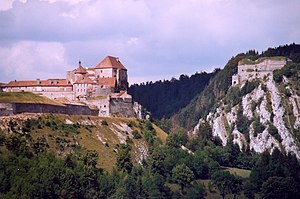Fort-de-Joux
| Fort de Joux | |
|---|---|
| Château de Joux | |
| Part of Maginot line | |
| La Cluse-et-Mijoux Near Pontarlier in France |
|

The Fort de Joux
|
|
| Coordinates | 46°52′21″N 6°22′27″E / 46.8725°N 6.3742°ECoordinates: 46°52′21″N 6°22′27″E / 46.8725°N 6.3742°E |
| Type | Castle, fort |
| Site information | |
| Owner | Communauté de communes du Larmont |
| Open to the public |
Tour, events. |
| Website | www |
| Site history | |
| Built | 11th century |
| Built by | Lords of Joux, Dukes of Burgundy, Charles Quint, Vauban, Joffre. |
| In use | until 1958 |
| Materials | Limestone and tufa |
| Battles/wars | 1814, 1871, 1940 |
The Fort de Joux or Château de Joux is a castle, transformed into a fort, located in La Cluse-et-Mijoux in the Doubs department in the Jura mountains of France. It commands the mountain pass Cluse de Pontarlier.
During its long history, the Château de Joux has gone through successive transformations. The first structure, in the 11th century, was made of wood. In the next century, the lords of Joux rebuilt the dungeon and the external fortifications in stone. Philip the Good, Duke of Burgundy, bought it in 1454 to transform it as a border fort. He added a moat and barracks. The château passed to Charles the Bold, Mary of Burgundy, Maximilian I, Holy Roman Emperor (Habsburgs), Margaret of Austria, and Charles Quint. Each successive owner made improvements. It was finally annexed by France in 1678 by Louis XIV.
While others have improved, or at least repaired, the castle during the course of its history, the château's most famous remodeler was Vauban, who modernized it between 1678 and 1693. The Austrians captured it in 1814. Later, the construction of the forts at Larmont during the 19th century provided reinforcement. In 1879, Captain (later Marshal) Joffre, then a military engineering officer, modernised it and transformed it into a fort included in the Maginot line to prevent German invasion from Swiss territory.
...
Wikipedia

